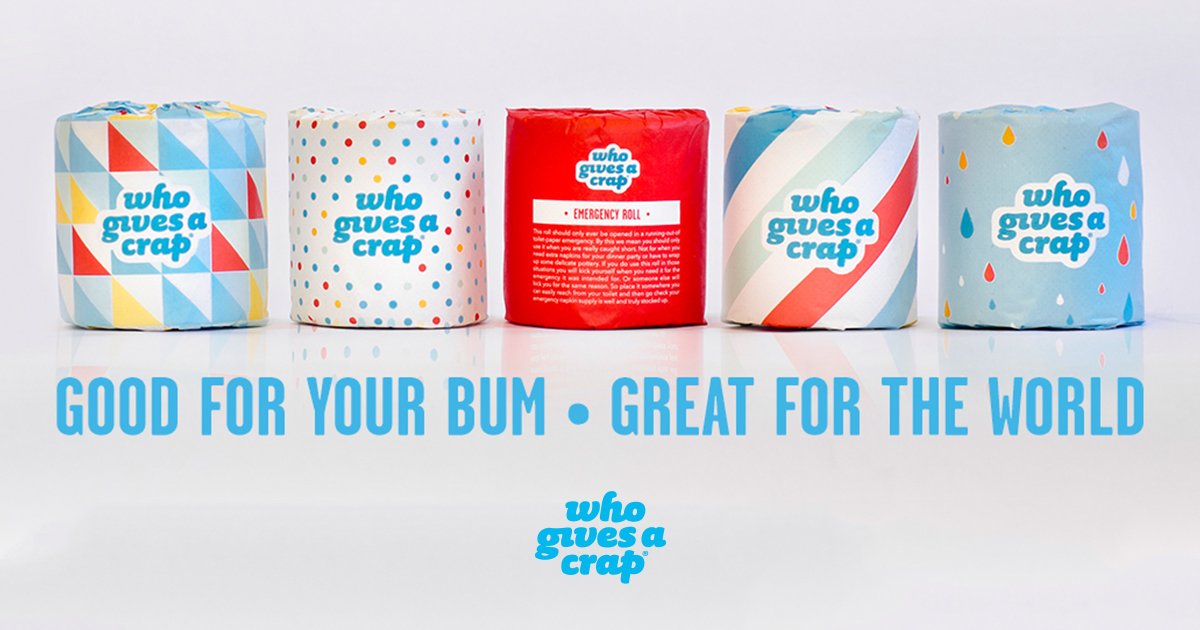I’ve always been a closet ‘prepper’.
You know the types, they’ve dug bunkers in the backyard, hoarded boxes of canned food and they have detailed bug-out-plans for when the Armageddon comes.
Unfortunately, I live in a small two-bedroom apartment in Bondi. I don’t even have a garage, so my options are limited.
My partner just rolls her eyes; “You’re no prepper! Where are the food supplies? Where’s our mountain getaway!?”
I guess I’m more dedicated to the theory of prepping, than I am to the practicalities.
But… one thing I never added to my bulk-buy list was toilet paper.
It’s been surprising to see this staple has been most in demand amid the Corona-crisis.
(To clarify: rushing to the supermarket when crisis hits to buy toilet paper isn’t prepping, in fact it’s the opposite, it means you’re un-prepared. A prepper has everything they need, long before the supermarket shelves are empty.)
I’m well prepared because I’ve long been a customer of ‘Who-Gives-a-Crap’. Not only because they’re a social enterprise (they give 50 per cent of their profits to charities building toilets, plumbing and wells) but also because their business model is revolutionising how we buy staples like TP.
They know my movements
The beauty of Who-Gives-a-Crap (and other similar subscription-style sellers) is that they have a stockpile of loo-paper, so I don’t have to.
Supermarkets don’t know how much toilet paper they’re going to sell in any week. But Who-Gives-a-Crap knows how many people are in my household and how much toilet paper we go through.
Yep, that’s a bit weird, but it’s worth it.
Like magic we have a new box of their colourfully wrapped, bamboo-butt-tissue delivered to our door right when we need it.
And, when a killer-virus-pandemic-health-crisis hits, they look after their subscribers first. Supermarket shelves had been cleared, but I wasn’t worried. Soon enough I got an email from Who-Gives-a-Crap and they assured me they had enough stock to satisfy my coming orders.
They had to stop taking on new customers, which was a bummer for many. But hey, you need to be prepared.
The modern supply-chain
The subscription model was popularised by the digital-native app-startups who want to slide their service into your everyday life. Their business model is based on people absorbing a small fee on their credit card each month, for access to an app or a service that makes lies easier.
But they weren’t the first.
As a kid, I remember when the milkman used to come every morning. He knew our order, and we paid at the end of the month. It helped the milk company manage their production, and we knew we’d have fresh milk every morning.
These days I don’t drink milk, but I still use toilet paper. And the reason this method of sale works so well is that it’s a commodity product.
As long as they maintain a base level of quality, I don’t care who makes my toilet paper. Yes, I want two-ply, and I want it to be sustainably sourced, but I don’t have a brand connection to TP.
Having said that, I do have a brand connection to the purpose behind Who-Gives-a-Crap. They direct profits towards bringing toilets to millions of people in developing countries. But they also make a profit for their founders.
I even spoke to the founder of Who-Gives-a-Crap, Simon Griffiths, on my podcast, Good Future, last year. You can listen here.
He explained that the traditional model of a charity is actually a terrible framework for a business. You’re forced to raise new grant funding every year, and then you have to spend it all. It leaves little space for the long-term planning an entrepreneur relishes.
Plus, a social enterprise fits into our existing legal and financial structures. It’s a company, and it’s for-profit. They can raise equity funding, and sell shares. But they maintain their ‘purpose’, and it’s a powerful competitive advantage.
Subscription everything
My final comment is that I think there is a big opportunity right now for a whole range of consumer staples products to be sold and distributed in this way.
The advantages are huge for both the producer and the customer.
For the producer, they have guaranteed revenue, because they’ve essentially been paid a month in advance. And they have vastly improved cash-flow projections, as long as people don’t cancel their subscriptions. This allows them to expand their scale, to reduce advertising costs, and through selling in bulk they should be able to reduce packaging and plastic waste.
For the customer, it’s convenient, which is huge. But also, it reduces your carbon-footprint as it’s more efficient to deliver from a central point, than for individuals to go to the supermarket.
Plus, it should be cheaper too.
Simple products, delivered at scale, with purpose at their core. That’s what I want.





